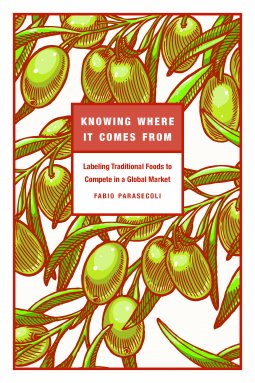
Knowing Where It Comes From
Labeling Traditional Foods to Compete in a Global Market
by Fabio Parasecoli
This title was previously available on NetGalley and is now archived.
Send NetGalley books directly to your Kindle or Kindle app
1
To read on a Kindle or Kindle app, please add kindle@netgalley.com as an approved email address to receive files in your Amazon account. Click here for step-by-step instructions.
2
Also find your Kindle email address within your Amazon account, and enter it here.
Pub Date Aug 15 2017 | Archive Date Aug 15 2017
University of Iowa Press | University Of Iowa Press
Description
Labeling regimes have moved beyond intellectual property to embrace community-based protections, intangible cultural heritage, cultural landscapes, and indigenous knowledge. Reflecting a rich array of juridical, regulatory, and activist perspectives, these approaches seek to level the playing field on which food producers and consumers interact.
Advance Praise
“This is a definitive account of place-based food labeling. Whether comparing the legal terms of European protected designations of origin versus U.S. trademarks or detailing the cultural imaginaries of Slow Food’s Arc of Taste, Parasecoli is a savvy guide to the political intricacies and social consequences of geographical indications.”—Heather Paxson, author, The Life of Cheese: Crafting Food and Value in America
“This lucid investigation of place-based food and drink labels lays out the intersection of trade networks and intellectual property regimes over the past century and provides important new insights. The legal and political engagements with these labels have complex, contradictory, and inconsistent consequences, thus providing a crucial cautionary tale to both producers and consumers.”—Amy B. Trubek, author, The Taste of Place: A Cultural Journey into Terroir
“This book demonstrates the global importance of place-based labels in contemporary food culture, fusing issues of development, heritage, and food security along the way. I particularly found Parasecoli an expert guide through the complex trade agreements, legal codes, and practical considerations that make ‘place’ matter for the future of food.”—Michaela DeSoucey, author, Contested Tastes: Foie Gras and the Politics of Food
“Knowing Where It Comes From is a singular achievement on the construction of local food in our contemporary societies. The critical and experienced perspective of Parasecoli reveals successfully the hits, interests, needs, and contradictions of the world of today’s food.”—F. Xavier Medina, director, UNESCO chair on food, culture, and development at the Universitat Oberta de Catalunya, Barcelona
Available Editions
| EDITION | Other Format |
| ISBN | 9781609385330 |
| PRICE | $75.00 (USD) |
Links
Featured Reviews
 Christi S, Reviewer
Christi S, Reviewer
I was expecting this to be more of a layman's book but it is very technical. It is well done and I'm sure it will be useful to those in the food industry in need of this information.
 sharanya p, Reviewer
sharanya p, Reviewer
A great book to read about where all comes from........
 Reviewer 378331
Reviewer 378331
Knowing Where It Comes From invites us to analyze and reflect on the changes and the future of place-based labels. It offers us a wide-angle view of the different tools that have been created to keep food linked to their place of origin and how their ripples affect everyone involved.
What I specially enjoyed about this book is how Parasecoli organized and threaded the concepts and examples making them naturally flow from one chapter to the next. I also liked that it is filled with several case studies from around the world, as it helps the reader build a well-informed opinion, based on how the historical, cultural, political, economical, social and legal aspects interact with each other and how their effects can differ from case to case.
If expository writing is not your cup of tea, this book might not be for you, but if you like books that are well backed-up, approach a subject from different angles and make unbiased comments, I recommend you this book. As a tip, if you haven't heard about place-based labels, familiarizing with the basics would make the book appear less daunting at the beginning. Even if you don't, it doesn't take long to understand and get fully immersed in the subject.
 Librarian 391714
Librarian 391714
This is so important! I really like to origins and the methods of tracking. Product labeling is essential and overlooked so often.
 Rony C, Reviewer
Rony C, Reviewer
Have you ever wondered how we are now able to find all our new quirky foods easily on the shelves in our local supermarkets? Thanks to this book that must have taken hours of research by Fabio Parasecoli, we have some of the answers.
I want to quote directly from the book; “cheese from France, wine from Australia, argan oil from Morocco, wild salmon from the North American Pacific…….. The list of products from all over the world that find their way to the shelves of gourmet stores and, increasingly, to less exclusive supermarkets and grocery stores, is constantly growing….. Delocalised consumption is often considered a sign of refinement and cosmopolitanism. New and exotic superfoods emerge regularly to great fanfare from the media, piquing the curiosity of consumers all over the world: guarana and açai from the Brazilian forests, quinoa from the Andes, and goji berries from China have become more affordable and easy to find.”
If like me, you have decided that acai, goji berries and quinoa are “must have” items in your meals then this book will fascinate you with how foods grown in different areas have become available to us, the consumers.
Fabio Parasecoli has listed all the abbreviations and acronyms which would normally not mean a thing to us, but now thanks to his lists, we can understand where our goods come from e.g.: AOP = American Origin Product. CETA = Comprehensive Economic and Trade Agreement, Canada and the European Union. GIAHS = Globally Important Agricultural Heritage Systems to name just a few that he has included in this hugely comprehensive reference book.
The laws, treaties and administrative measures that govern the movement of all commodities date back to 1867 when the expression “intellectual property” appears in the Constitution of the North German Confederation up to 2015; Geneva Act of the Lisbon Agreement on Appellations of Origin and Geographical Indications.
I know that in future, I will be looking at my food cupboard in a different light. The goods are not going to be “received from whichever supermarket” but will be studied for details of their origin before they get packed onto my kitchen shelves or drinks rack.
Treebeard
Breakaway Reviewers received a copy of the book to review.


















